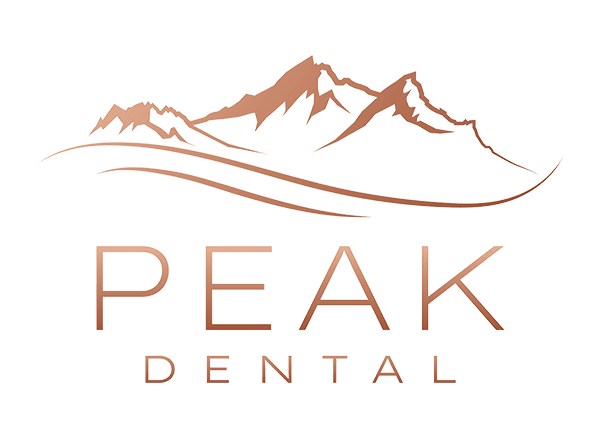Do you have a chipped tooth or a gap between your teeth that you’d like to fix? Cosmetic dental bonding might be just what you need! Dental bonding is a simple and effective way to improve the look of your teeth. Dental bonding in our Winchester, VA, dental office can quickly give you a whiter, more even smile.
Dental bonding is a cosmetic dentistry service where Dr. Aaron Barborka applies a tooth-colored resin material to your teeth. He can then harden it with a special light. This process bonds the material to your tooth, improving its appearance. At Peak Dental, we can use dental bonding to repair chipped or cracked teeth, close gaps, change the shape of teeth, or improve the color of your teeth.

Is Dental Bonding Right for You?
Dental bonding is a simple and effective way to improve your smile. It’s a great option for people who want a fast and affordable way to fix minor dental issues.
Improves the Appearance of Your Smile
One of the biggest benefits of dental bonding is how much it can improve the look of your teeth. If you have chips, cracks, or discoloration, bonding can make your teeth look smooth and even again. The resin matches the shade of your natural teeth, so the results blend in perfectly. Many people choose bonding as a cosmetic solution to make their smile look healthier and more attractive.
Quick and Painless Procedure
Unlike other dental treatments, bonding is quick and painless. The entire procedure usually takes less than an hour per tooth. In most cases, we don’t even need anesthesia unless bonding is used to fill a cavity. Because the procedure is simple and non-invasive, many patients experience no discomfort.
Cost-Effective Solution
Compared to other cosmetic dental treatments, dental bonding is one of the most affordable options. Veneers and crowns can be expensive and often require multiple visits, but bonding is much more budget-friendly. You save time and money since the procedure is done in just one appointment. This makes bonding an excellent choice for people who want to enhance their smile without spending a lot.
Protects and Strengthens Teeth
Dental bonding doesn’t just make your teeth look better—it also makes them stronger. The resin covers weak spots on your teeth, protecting them from further damage. If you have a small chip or crack, bonding can prevent it from worsening. It also creates a smooth surface, making your teeth easier to clean and less likely to collect plaque.
Reversible and Easy to Maintain
Unlike veneers or crowns, bonding is reversible. If you want a different treatment, your dentist can remove the bonding without damaging your natural tooth. Maintaining bonded teeth is also simple. You just need to brush and floss daily, avoid biting on hard objects, and visit your dentist regularly for checkups.
What to Expect with Dental Bonding
Getting dental bonding is a quick and painless procedure.
Consultation: The first step is to schedule a talk with Dr. Barborka. During this visit, you will explain what you want out of the process. Dr. Barborka will need to look at your teeth to make sure your oral health is in a good place. This allows us to see if bonding is the right option for you.
Preparation: Dental bonding typically requires little to no preparation. In most cases, you don’t need anesthesia unless we use the bonding to fill a decayed tooth. Dr. Barborka will choose a resin color that matches your natural teeth.
Bonding Process: The bonding process involves several steps.
- Tooth Preparation: Dr. Barborka will roughen the surface of the tooth and apply a conditioning liquid. This helps the bonding material adhere to the tooth.
- Applying the Resin: He applies and molds the tooth-colored resin to the desired shape.
- Curing the Resin: We then use a special light to harden the resin, bonding it to the tooth.
- Final Touches: Once the resin is hardened, Dr. Barborka will trim, shape, and polish it to match the rest of your teeth.
Dental Bonding FAQs
Dental bonding is a versatile, affordable treatment ideal for almost any patient. To learn more, read the answers to these frequently asked patient questions.
How long does dental bonding last?
Dental bonding typically lasts between 3 and 10 years, depending on the bonding location and how well you care for your teeth. Bonding on front teeth may wear down faster due to biting pressure. Good oral hygiene, avoiding hard foods, and regular dental checkups can help extend its lifespan. If the bonding wears or chips, it can usually be repaired easily.
How long does the bonding procedure take?
The bonding process usually takes 30 to 60 minutes per tooth. You may need more than one visit if you’re having multiple teeth bonded. Since no lab work is needed, it’s often completed in a single appointment. It’s a relatively fast and convenient option compared to other cosmetic treatments.
Does dental bonding stain over time?
Yes, the composite resin used in bonding can stain, especially if you frequently consume coffee, tea, red wine, or tobacco. Unlike porcelain, bonding materials are porous and more prone to discoloration. While mild staining can sometimes be polished away, deep discoloration may require replacement. Practice good oral hygiene and limit staining foods to keep your bonding looking its best.
Can bonded teeth be whitened?
No, bonding material does not respond to teeth whitening treatments. If your natural teeth are whitened, the bonded area may appear darker in contrast. If you’re considering whitening and bonding, it’s best to whiten first and match the bonding to your new tooth shade. Dr. Barborka can advise on the best sequence for treatment.
What should I avoid after getting dental bonding?
Avoid hard or crunchy foods, dark-colored drinks, and tobacco for at least 48 hours after bonding. These can damage or stain the resin before it fully sets. Over time, avoid habits like nail biting, chewing on pens, or opening packages with your teeth. These precautions help prevent chips and prolong the bonding’s appearance.
How do I know if dental bonding is right for me?
Dental bonding is ideal for people with minor cosmetic issues who want a fast, affordable smile enhancement. You’re likely a good candidate if you have good oral health and realistic expectations. However, bonding may not be the best choice for large restorations or teeth under heavy bite pressure. Dr. Barborka will examine your teeth and discuss the best treatment options for your goals.
